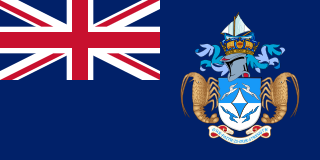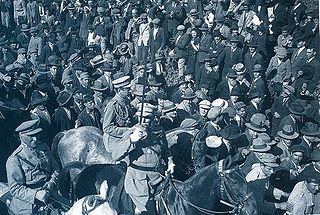Related Research Articles

Brazil, officially the Federative Republic of Brazil, is the largest country in both South America and Latin America. At 8.5 million square kilometers and with over 211 million people, Brazil is the world's fifth-largest country by area and the sixth most populous. Its capital is Brasília, and its most populous city is São Paulo. The federation is composed of the union of the 26 states and the Federal District. It is the largest country to have Portuguese as an official language and the only one in the Americas; it is also one of the most multicultural and ethnically diverse nations, due to over a century of mass immigration from around the world; as well as the most populous Roman Catholic-majority country.

Leonardo da Vinci was an Italian polymath of the High Renaissance who is widely considered one of the most diversely talented individuals ever to have lived. While his fame initially rested on his achievements as a painter, he also became known for his notebooks, in which he made drawings and notes on science and invention; these involve a variety of subjects including anatomy, astronomy, botany, cartography, painting, and palaeontology. Leonardo's genius epitomized the Renaissance humanist idea, and his collective works compose a contribution to later generations of artists rivalled only by that of his contemporary Michelangelo.

Portugal, officially the Portuguese Republic, is a country located on the Iberian Peninsula, in southwestern Europe. It is the westernmost sovereign state in mainland Europe, being bordered to the west and south by the Atlantic Ocean and to the north and east by Spain. Its territory also includes the Atlantic archipelagos of the Azores and Madeira, both autonomous regions with their own regional governments. The official and national language is Portuguese.

Rio de Janeiro, or simply Rio, is the second-most populous city in Brazil and the sixth-most populous in the Americas. Rio de Janeiro is the capital of the state of Rio de Janeiro, Brazil's third-most populous state, after São Paulo and Minas Gerais. Part of the city has been designated as a World Heritage Site, named "Rio de Janeiro: Carioca Landscapes between the Mountain and the Sea", by UNESCO on 1 July 2012 as a Cultural Landscape.
Samba, also known as samba urbano carioca or simply samba carioca is a Brazilian music genre that originated in the Afro-Brazilian communities of Rio de Janeiro in the early 20th century. Having its roots in the cultural expression of West Africa and in Brazilian folk traditions, especially those linked to the primitive rural samba of the colonial and imperial periods, is considered one of the most important cultural phenomena in Brazil and one of the country symbols. Present in the Portuguese language at least since the 19th century, the word "samba" was originally used to designate a "popular dance". Over time, its meaning has been extended to a "batuque-like circle dance", a dance style, and also to a "music genre". This process of establishing itself as a musical genre began in the 1910s and it had its inaugural landmark in the song "Pelo Telefone", launched in 1917. Despite being identified by its creators, the public, and the Brazilian music industry as "samba", this pioneering style was much more connected from the rhythmic and instrumental point of view to maxixe than to samba itself.

Tristan da Cunha, colloquially Tristan, is a remote group of volcanic islands in the south Atlantic Ocean. It is the most remote inhabited archipelago in the world, lying approximately 1,732 miles (2,787 km) off the coast of Cape Town in South Africa, 1,514 miles (2,437 km) from Saint Helena and 2,487 miles (4,002 km) off the coast of the Falkland Islands. These distances equate respectively to 1505, 1316 and 2161 nautical miles.

The viol, viola da gamba, or informally gamba, is any one of a family of bowed, fretted and stringed instruments with hollow wooden bodies and pegboxes where the tension on the strings can be increased or decreased to adjust the pitch of each of the strings. Frets on the viol are usually made of gut, tied on the fingerboard around the instrument's neck, to enable the performer to stop the strings more cleanly. Frets improve consistency of intonation and lend the stopped notes a tone that better matches the open strings. Viols first appeared in Spain in the mid to late 15th century and were most popular in the Renaissance and Baroque (1600–1750) periods. Early ancestors include the Arabic rebab and the medieval European vielle, but later, more direct possible ancestors include the Venetian viole and the 15th- and 16th-century Spanish vihuela, a 6-course plucked instrument tuned like a lute that looked like but was quite distinct from the 4-course guitar.

Vasco da Gama, 1st Count of Vidigueira, was a Portuguese explorer and the first European to reach India by sea.

Futebol Clube do Porto, MHIH, OM, commonly known as FC Porto or simply Porto, is a Portuguese professional sports club based in Porto. It is best known for the professional football team playing in the Primeira Liga, the top flight of Portuguese football. Founded on 28 September 1893, Porto is one of the "Big Three" teams in Portugal – together with Lisbon-based rivals Benfica and Sporting CP, that have appeared in every season of the Primeira Liga since its establishment in 1934. They are nicknamed Dragões (Dragons), for the mythical creature atop the club's crest, and Azuis e brancos (Blue-and-whites), for the shirt colours. The club supporters are called Portistas. Since 2003, Porto have played their home matches at the Estádio do Dragão, which replaced the previous 51-year-old ground, the Estádio das Antas.

Club de Regatas Vasco da Gama, also known as Vasco da Gama or simply Vasco, is a Brazilian professional sports club based in Rio de Janeiro, in the neighborhood of Vasco da Gama, that was founded on August 21, 1898, by Portuguese immigrants, and still has a strong fanbase among the Portuguese community of Rio de Janeiro. It is one of the most popular clubs in Brazil, with more than 23 million supporters. Although they compete in a number of different sports, Vasco is mostly known for its football team. It plays in the Campeonato Carioca, the state of Rio de Janeiro's premier state league and in the Campeonato Brasileiro Série A, the top tier of Brazilian football league system.

The president of Brazil, officially the President of the Federative Republic of Brazil or simply the President of the Republic, is both the head of state and the head of government of Brazil. The president leads the executive branch of the federal government and is the commander-in-chief of the Brazilian Armed Forces. The presidential system was established in 1889, upon the proclamation of the republic in a military coup d'état against Emperor Pedro II. Since then, Brazil has had six constitutions, three dictatorships, and three democratic periods. During the democratic periods, voting has always been compulsory. The Constitution of Brazil, along with several constitutional amendments, establishes the requirements, powers, and responsibilities of the president, their term of office and the method of election.

Os Lusíadas, usually translated as The Lusiads, is a Portuguese epic poem written by Luís Vaz de Camões and first published in 1572. It is widely regarded as the most important work of Portuguese literature and is frequently compared to Virgil's Aeneid. The work celebrates the discovery of a sea route to India by the Portuguese explorer Vasco da Gama (1469–1524). The ten cantos of the poem are in ottava rima and total 1,102 stanzas.

Lagos is a municipality at the mouth of Bensafrim River and along the Atlantic Ocean, in the Barlavento region of the Algarve, in southern Portugal. The population in 2011 was 31,049, in an area of 212.99 km2. The main town of Lagos has a population of approximately 22,000. Typically, these numbers increase during the summer months, with the influx of visiting tourists and seasonal residents. While the majority of the population lives along the coast and works in tourism and services, the inland region is sparsely inhabited, with the majority of the people working in agriculture and forestry.

Sport Lisboa e Benfica, commonly known as Benfica, is a professional football club based in Lisbon, Portugal, that competes in the Primeira Liga, the top flight of Portuguese football.

The Brazilian Navy is the naval service branch of the Brazilian Armed Forces, responsible for conducting naval operations. The Brazilian Navy is the largest navy in South America and in Latin America, and the second largest navy in the Americas, after the United States Navy.

The 28 May 1926 coup d'état, sometimes called 28 May Revolution or, during the period of the authoritarian Estado Novo, the National Revolution, was a military coup of a nationalist origin, that put an end to the unstable Portuguese First Republic and initiated 48 years of authoritarian rule in Portugal. The regime that immediately resulted from the coup, the Ditadura Nacional, would be later refashioned into the Estado Novo, which in turn would last until the Carnation Revolution in 1974.

The Taça da Liga, known outside Portugal as Portuguese League Cup, is an annual football club competition organised by the Liga Portuguesa de Futebol Profissional (LPFP) for teams competing in the Primeira Liga and LigaPro, the top two tiers of Portuguese football. Unlike the French and English league cups, the winners do not qualify for European competitions.

Bruno Miguel Borges Fernandes is a Portuguese professional footballer who plays as a midfielder for Premier League club Manchester United and the Portugal national team.
References
- Consello da Cultura Galega (ed.), Documentos da Catedral de Lugo, (Santiago de Compostela, 1998)
| | This Galician biographical article is a stub. You can help Wikipedia by expanding it. |
| | This article about a Spanish Catholic bishop or archbishop is a stub. You can help Wikipedia by expanding it. |